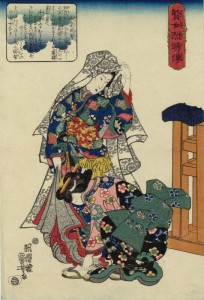 Born at the end of the tenth century in the Heian period, Izumi Shikibu was a Japanese poet who was from an influential family in Echizen. Shikibu was part of a group of Japanese poets who were known as the 36 Immortals, selected from the three main periods of poetry by Fujiwara no Kinto. She is well-known for her romantic and erotic verse and the numerous affairs she had during her lifetime.
Born at the end of the tenth century in the Heian period, Izumi Shikibu was a Japanese poet who was from an influential family in Echizen. Shikibu was part of a group of Japanese poets who were known as the 36 Immortals, selected from the three main periods of poetry by Fujiwara no Kinto. She is well-known for her romantic and erotic verse and the numerous affairs she had during her lifetime.
When in her 20s, Shikibu married Tachibana no Michisada and moved to the provinces for a while before finding the country less agreeable than the city where she was born. She returned to her home town of Kyoto and took part in the imperial court, writing poetry and causing scandal.
Though men in this era could take multiple wives or mistresses, women were expected to devote themselves to one person, something that Shikibu seemed to think didn’t apply to her. She had a very public dalliance with Prince Tametaka and her husband, Michisada, then even more publicly divorced her. She was also disowned by her father and things went from bad to worse when the prince died suddenly after contracting what was believed to be the plague.
Undeterred, Shikibu began a relationship with his half-brother, Prince Atsumichi, which caused more scandal when it became public shortly after. Shikibu wrote her diary at this time, which may have been done in some way to provide an explanation and acknowledgment to other members of the Imperial Court. When Atsumichi died too, Shikibu fell in with the court of Empress Shoshi where her attitude to life and passion earned her the moniker of The Floating Lady.

Shikibu’s passion comes across in her poetry of the time. The Diary of Izumi Shikibu covered a period of five years when she was having her affair with Prince Atsumichi and combined romanticism and eroticism with Buddhist philosophy.
At the Imperial Court she had a rivalry with her sister who was also a poet and was praised for her short verses and their emotional power. This was the time when she wrote her most influential works that were published in later Imperial collections.
Her poetry is characterized by great passion and the desire to choose her own romantic fate. It was often the way that a new affair first came to people’s attention when a public poem was written about it.
Her work has been covered in great depth in the 20th Century with publications such as Love Poems from the Japanese by Kenneth Roxroth who said that of all the poets from that era Shikibu had the greatest connection to the Buddhist traditions and mentality.

Later in life Shikibu married an army commander, Fujiwara no Yasumasa and headed for the provinces with him. It is said that she lived a long and prosperous life, outliving her own daughter, but little is known of her death which was thought to be sometime after 1033, the date of her last correspondence.

